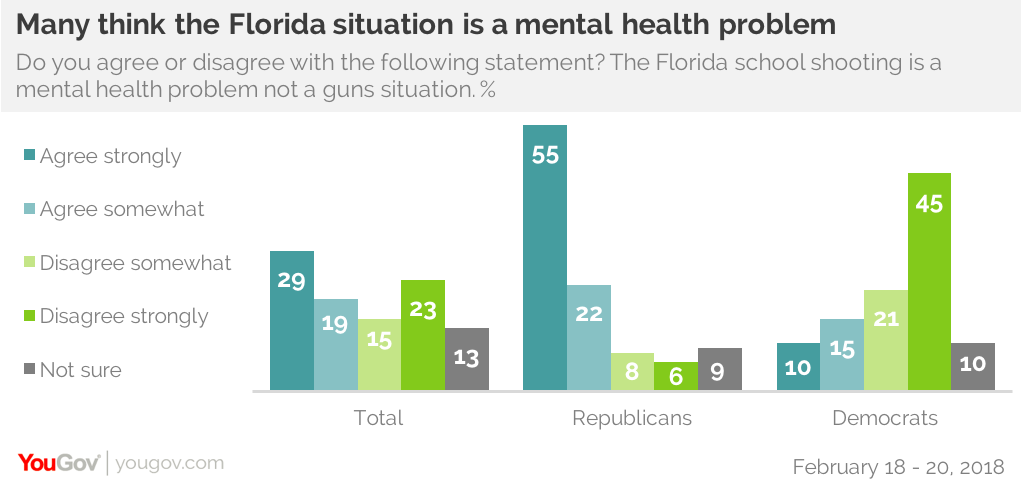Is it Really Mentally Ill People Doing Massive Shootings in the United States?
On July 20, 2012, James Holmes fired shots at a midnight premiere
of The Dark Night Rises, killing 12
people and injuring 70 others by gunfire, teargas, and fleeing accidents. After
the incident, James Holmes was brought to trial on July 23, 2012. However,
instead of recieving a prison sentence, he was found not guilty due to insanity and quickly taken to a mental hospital. It
wasn’t until 2015 that the jury rejected his insanity plea because he told the jury that he would't testify in court. He was then found guilty of his actions and was charged with 12 murders and sentenced to life in prison without parole (CNN). However, the
question is: Do mass shootings happen because it is a mental health issue?
 |
| Frankovic, Kathy. “Mass Shooting after Mass Shooting, Opinions about Gun Control Don't Change.” . |
Mental illness and mass shootings have been linked
together for countless years. According to Elizabeth Llorente, a journalist
from Fox News, she reports that Grant Duwe, a criminologist from Minnesota
Department of Corrections, found that 59% of 185 mass shootings were caused by
mental illness (Fox News).
This study was from 1900-2017, in which many cases showed signs
of mental illness long before their attacks. Such examples were Adam Lanza, who terrorized Sandy Hooks Elementary School in 2012. Lanza, who was struggling with a developmental disorder and was on psychiatric medication, stopped taking these two
medications right before the shooting. Another example is Jiverly Wong, who
suffered from paranoia. Wong was charged in the America Civics
Association shooting in 2009.
Are these reasonable cases of mental illness?
However, not all cases of mass shootings involve mental
illness. Michael Stone, a forensic psychiatrist from Columbia College of Physicians
and Surgeons, reports that only 2 of 10 people who commit mass murders are actually
mentally ill. He states that the shooters' motives are humiliation, antisocial
disorders, or intense rage, to name a few (Washington Post).
Because of these reasons, it is possible that Eric
Harris, one of the shooters who committed the Columbine High School Massacre, in
1999, was in fact not mentally ill but was just angry that he had been rejected by
the Marine Corps and he was a social outcast in his school. It also
suggests that he was motivated by these reasons to intimidate and harm others.
The harm is not the people, it is the guns. Why is purchasing
a gun so easy?
However, there are many ways people can reduce mass
shootings. According to a study from Everytown, states who had a close background
check had 52% fewer mass shootings from January 2009-July 2015. Every state
that required a background check saw 37 mass shootings, while states that did
not require mass shootings saw 96 (Everytown).
Background checks are one way to analyze people who are purchasing firearms. A report from Salvador Rizzo, who works for the Washington Post, reports that with background checks people can discover if a person is
mentally ill or not. 3 million people, or 1.5%, were denied guns because of
background checks (Washington Post).
Mental illness does not define all mass shooters.
There are many cases where the shooter was not mentally ill and still committed
the shooting. However, cases such as Sandy Hook, do have mentally ill people
getting firearms and committing crimes. Even though there is a slim margin between mass shootings and mentally ill people committing crimes, most perpetrotors are
not mentally ill. However, with more background checks, people can determine
who gets a firearm and who doesn’t.

I like how you put the shooting attack at the movie theater, I forgot about that event. Also i like how you use the events to discuss both shooters on whether they had mental illness or not and with what the shooters charged with for their murder count. However, as much as people believe that mental illness and mass shootings are linked, I would not agree to that one hundred percent. It's more of those with mental illness who become victims to violence than becoming suspects, since the majority of shooters do not suffer from mental illness like you said. Every killer has their certain way of killing, leaving us in question on why they do it. You are correct on your research, good job.
ReplyDeleteCan you go over the Holmes case a bit more here? Was he originally tried and convicted but considered insane, and then the case went to an appellate court? How did that first conviction with insanity get overturned? What was the piece of the puzzle there that changed?
ReplyDeleteIt seems to be that no matter the cause, more restrictions (registrations, wait times, limitations on how many guns can be purchased at any time) can help limit gun violence in those areas. What I find absolutely fascinating is your accompanying image that shows how one "connects" mental illness/gun violence with political affiliation. So I guess the question now is--how does one get an entire political party to amend how they "see" mental illness if the data, overall, suggests there is a limited connection?